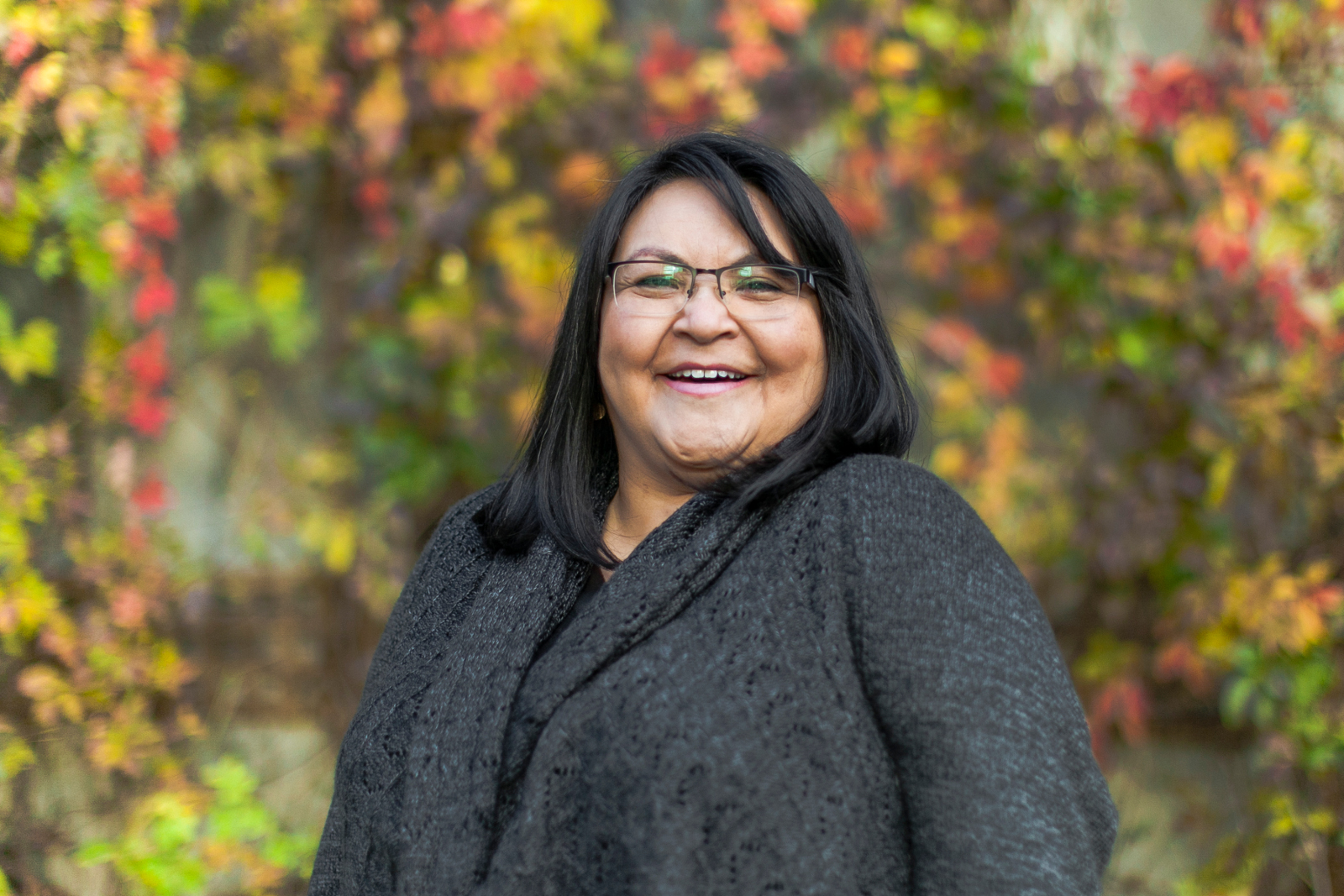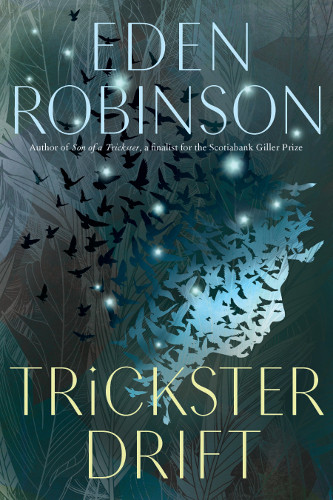Anyone who has ever talked with Eden Robinson knows her laugh is contagious. We spoke both by email and on the phone, and her wry observations, followed by that extraordinary laugh, kept cracking me up, though I was aiming to be professional and dignified.
I caught up with Eden while she was finishing her fellowship at the Leighton Studios at the Banff Centre for the Arts, in Alberta, where she is working on her final novel in the Trickster Trilogy. The second novel, Trickster Drift, is due out in October. “I’m hoping it’s just a trilogy!” she says. “I won a fellowship last year, and it came with this residency.”
“That’s fantastic!”
“Yeah, it was a lovely surprise. The deer here are very tame,” she says. As Eden Robinson gazes at deer from a luminous mountain lodge and works on the new novel, I interrupt her with a few questions:
Rachel: Reading your books, I felt like you put the “fun” in “dysfunctional.” They are dark and gothic and twisted, but somehow the characters are still likable, because of that quirky playfulness and humor that no adversity quite seems to crush. How did you choose that approach?
Eden: I like characters with grey areas. When I’m reading, I find myself drawn to characters that have ambiguity and sass. When you spend hours each day with a character you have to like them but at the same time not be bored by them.
I’ve always been goofy. It’s coming through in my writing more because aging is taking away my filters.
Rachel: I love this! There was a ten-year pause between Son of a Trickster and your previous novel, Blood Sports. What were you up to during that time?
Eden: I had an intense couple of years–my health problems, my parents’ health issues, family crisis. They haven’t slowed down, but I’ve adapted and am learning how to function when life sends you lemon grenades.
Rachel: Yet another gift of aging wisely—not only living the unfiltered version of who you are, but learning how to adapt to the lemon grenades!
Talk to us about Jared, the teenage hero of Son of a Trickster. How did you create him and how do you feel about him these days?
Eden: I wanted to write a Trickster story, but when I wrote it from the Trickster’s point of view, it came off as a little arrogant. He’s full of himself. So I realized I needed a Watson for my Sherlock.
I tried from the p.o.v. of Maggie, Jared’s mother, and from Hank, a character introduced in Trickster Drift, the sequel. At the time, I was also writing a short story collection about a traditional dance group in East Vancouver that forms and falls apart. One of the characters arrives at the Vancouver Greyhound bus depot from a small town in BC. The story never went anywhere, but the scene haunted me and eventually became the moment Jared arrives in Vancouver and meets his estranged aunt, a writer and political activist.
Rachel: What is it like to see your book optioned for film? How involved are you in this process?
Eden: Thrilling. But I don’t want to adapt my own novels. I’ve tried and it’s a writing process I don’t enjoy. I like to hole up in caves and draw serial-killeresque outlines on the walls.
Rachel: I am fascinated by the juxtaposition of the supernatural and traditional Haisla and Heiltsuk culture, the blend of new, old and weird, to create modern myths. It’s one of the most appealing aspects of Son of a Trickster. If I were in the audience at one of your readings, this would be one of those annoying questions that is really a statement. So let me try to shift it: would you like to comment on your use of juxtaposition of western horror and Indigenous folklore to create new myths for our apocalyptic times?
Eden: I think we’re at the point in Indigenous writing where we can fuse our myths with modern times with a certain amount of freedom. I’m careful with the stories I set loose in my worlds—potlatch cultures have a specific kind of copyright. But our stories in our public domain are full of humor. I gravitate to the darker, more horror-filled stories, though. I like creepy atmospheres and menace, which seems to be our era.
Rachel: How do you define success as a writer?
Eden: Enjoying the process. Pushing my skill sets. Finishing projects.
Rachel: Do you have a literary community that is a source of strength and inspiration for you?
Eden: I have many circles that hold me up and inspire me. So many talented people being bold.
Rachel: What are your current preoccupations as a writer?
Eden: Earthquakes. Corona viruses. On-reserve housing policy. I’m not sure what I’ll be writing after the Trickster series, but I’m having fun with the research for my obsessions.
Rachel: If you hadn’t become a writer, what might you have become instead?
Eden: Information technologist. I love organizing paper. I love nosing through archives.
Rachel: If you could advise your young writer self about the path you’d chosen, what might you say?
Eden: I had a lot of anxiety. I wish I’d taken the time to relish my journey. I mostly remember the agony of insecurity and the grind of ambition. I had many special moments that I didn’t savour.
Rachel: What do your fans and readers mean to you?
Eden: Ultimately, your work is about connection. Fans want to share the space you’ve created, and they just fill you with joy when you meet.
Rachel: How do you deal with rejection, bad reviews, bad sales and other setbacks on the road to fame?
Eden: Reading is so personal. You are literally in someone else’s head. And it may not be a space they want to share. Sometimes you have to tell people that it’s okay to put down your book. I know my family couldn’t make it through Blood Sports, especially the 40-page torture scene.
Rachel: What might you want to share on the conflicts occurring now in the CanLit world? What thoughts and survival strategies might you have on the conflicts occurring in the Indigenous writing world? Do you ultimately feel more hopeful or more pessimistic about these events?
Eden: None of these conflicts within CanLit or Indigenous writing are new. It’s very much like the #MeToo movement. We’re having uncomfortable conversations because they’re necessary. Bravo to the writers doing the heavy lifting. They give me hope. We’re in a world in transition and we have bold voices leading the way.
Rachel: Thank you for ending on a note of hope. It is easy to be discouraged, even by the fact that these conflicts arise with regularity, like a Hydra that just won’t die. I have heard from some Indigenous writers that the good thing about these struggles is that new space is being claimed for a multiplicity of Indigenous voices, not just a few token representatives. Do you see that happening, especially here in the Cascadia region?
Eden: The biggest changes I see are in the emerging Indigenous writers. They are claiming space on social media, directly challenging preconceived notions and doing it fearlessly. Usually, when Indigenous voices speak, we have to be careful not to be angry. There’s a lot of moderating and tone policing. But now there is a whole range of voices—angry, hopeful. These emerging writers are not afraid of conversations. It’s like the Parkland Survivors; they have grown up with social media, they are much more comfortable with these conversations. I shouldn’t generalize—there are older writers who are involved in these conversations as well. But I started my career writing on a typewriter, a manual typewriter! (Eden laughs, which makes me laugh). The more people try to explain Snapchat to me, the more alien it feels. I don’t like the little map that shows where you are and where your friends are.
Rachel: Yeah, me too! I find it creepy. What do you see that’s important right now about Indigenous writers in the Cascadia region?
Eden: There’s a huge split in Indigenous responses to the pipelines. In the South, especially Vancouver, the response has been very strong, especially among coastal writers. I know that my mother’s community, the Heiltsuk community, they’ve been very active. In 2016 there was a ship called the Nathan E. Stewart, an articulated tug boat taking bunker fuel up to Alaska, and it ran aground on one of the most biodiverse areas in the Heiltsuk community. The Heiltsuk were first on the scene. It took 24 hours to get a response from the federal government; it was a horrible spill response—it was a minor spill and it caused so much heartache. The Heiltsuk community is deeply dependent on marine resources. The polluters haven’t paid. The Heiltsuk band council is on the hook for their expenses having responded to the spill.
When the tankers start coming into Burrard Inlet, Kinder Morgan isn’t responsible for the marine spills, only for what happens on land. That’s the responsibility of the shippers. That’s the big issue for the Coastal Indigenous people. It’s the federal response. We don’t have the capacity to respond to spills. We have zero capacity to respond to a bitumen spill right now. We’re talking about the end of salmon as we know it. That is a federal responsibility.
I think the response from people who live in Vancouver has been widely derided and mocked. It’s a very frustrating thing. To proclaim that Vancouver is a sacrifice zone is the height of arrogance. It just boggles my mind.
Rachel: It’s incredibly frustrating. It’s hard to feel hopeful.
Eden: I don’t think the Tseil-Waututh, Musqueam, and Squamish are going to give up, and in the interior, in the Secwepemc territory, there are the tiny house warriors building along the pipeline. There’s a hard core of activism there.
Rachel: That’s so good to hear, Eden. Thank you.
Eden Robinson is a Haisla/Heiltsuk author who grew up in Haisla, British Columbia. Her first book, Traplines, a collection of short stories, won the Winifred Holtby Memorial Prize and was a New York Times Notable Book of the Year in 1998. Monkey Beach, her first novel, was shortlisted for both The Giller Prize and the Governor General’s Literary Award for fiction in 2000 and won the BC Book Prize’s Ethel Wilson Fiction Prize. Her latest novel Son of a Trickster was shortlisted for The Giller Prize.
Rachel Rose is the Poet Laureate of Vancouver, the editor of Sustenance: Writers from BC and Beyond on the Subject of Food (Anvil Press) and the author of The Dog Lover Unit: Lessons in Courage from the World’s K9 Cops (shortlisted for the Arthur Ellis award for best non-fiction crime book). Recent work has appeared in publications such as The Globe & Mail, The American Poetry Review, Monte Cristo Magazine, The Vancouver Sun and The Press Democrat.
Further reading:
Heiltsuk Nation says response to tug sinking inadequate
Indigenous leaders shut down construction of Kinder Morgan pipeline
Did you find this interview fascinating or informative? Cascadia Magazine is a reader-supported publication — we rely on the generous financial support of readers like you to publish articles like this, and to pay our writers a fair rate for their work. Please consider making a donation today!


